Mighty River Power Float - PM, Tony Ryall, Bill English
By Mark P. Williams
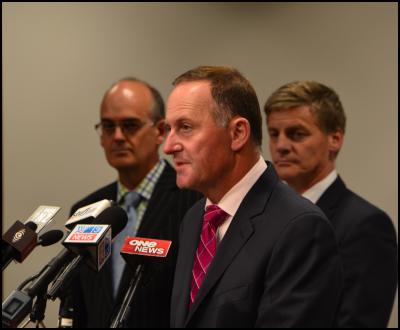
Today the PM confirmed that the government would be going ahead with its proposed sale of 49% of Mighty River Power later this year, subject to market conditions. He was accompanied by the Minister of Finance, Bill English, and Minister of SOEs, Tony Ryall.
He reiterated the government's rationale and intentions behind the partial sale of State Owned Enterprises, referring again to the estimated figure of $5-7bn which would be used to invest in the Christchurch rebuild, in schools, and in hospitals, rather than borrowing on risky overseas markets to raise a similar amount.
He explained
the process:
- Mighty River Power was removed from the SOE Act
- A pre-registration process will open tomorrow, running until 22nd March (with no obligation to buy) where people can register online or via a call centre
- There will then be a national marketing campaign to raise awareness and garner interest
- Then, in Mid-April an offer will be lodged with the FMA and New Zealanders will have three weeks to apply for shares.
After that time the price for shares will be determined and the Crown will decide on the final allocation of shares. Mighty River Power will be listed on the New Zealand Stock Exchange (NZX) with a secondary listing on the Australian Stock Exchange (ASX). The Prime Minister explained that some Australian institutions would not be able to invest if the company were not listed on the ASX. The PM said that he anticipated the process would be completed mid-May, before the budget.
The ministers then outlined the measures being taken by the government to favour New Zealanders wishing to purchase shares in the company.
Mr English and Mr Ryall will be in Auckland tomorrow to launch the official pre-registration period for New Zealanders wanting to find out more. This pre-registration period is expected to last for three weeks and only once people have made expressions of interest via this process will the government continue with the process of pricing and allocating shares.
The Prime Minister then handed over first to Mr English and then to Mr Ryall to explain the details of the float before taking questions from the press.
Mr English explained a few details of the process and how New Zealanders can find out information about the sales. He said that the allocation of shares would meet the government's policy of "widespread New Zealand ownership".
Mr Ryall then explained the criteria
the government had set to achieve this:
The requirements
are:
- New Zealanders or New Zealand Resident
- An Inland Revenue Number and a New Zealand bank account
- A New Zealand address
The minimum application for shares
would be $1000 with $100 increments. He then outlined the
preferential measures aimed specifically at New Zealanders,
these include:
- New Zealand 'retail' investors applying for shares up to the value of $2000 would not have their shares 'scaled' in the event of oversubscription
- Loyalty bonus scheme for retail investors who retain their shares for a minimum period (to be set) only available to New Zealanders
- Employees of Mighty River Power will be entitled to a minimum guaranteed allocation of $5000 worth of shares each
- Iwi groups yet to settle claims will have the option of taking their settlement in shares
Questions to the Ministers
The PM was asked if the government was still guaranteeing that the shares would be 85% New Zealand held. He responded that he was very confident that they would meet that aim and repeated that his government had made its political commitment to doing so. Pressed to say whether this was a guarantee he said "that's what we've been measured by" and "if we weren't to meet that target there'd be a lot of questions asked".
whether he plain and that it remained committed to meeting the target it had set itself.
The PM was asked why there were no details yet offered on the loyalty bonus even though it had been discussed for some time. He responded that it depended on the process and numbers itself.
The PM was asked to explain what would happen to New Zealanders who wanted to buy more than the guaranteed $2000 worth of shares, for example $3000-5000. He responded that anything above $2000 depended on the overall level of interest—someone applying for $5000 might end up with between $3000-5000 but not less than the guaranteed $2000.
The PM was asked whether there would be a limit placed on how much could be owned by Australian shareholders. He responded that the government would decide on the allocation of Australian institutional investors.
The PM was asked how much of the 49% would be made up of retail investors and how much of institutional investors. Mr Ryall responded that these were details which they were not in a position to discuss. Asked for a "ball park" figure Mr Ryall refused.
The Ministers were asked what percentage of the $5-7bn they were expecting to raise with this float. Mr English said that that would "become clearer" through the process which would be the test of the value of Mighty River Power.
The Ministers were asked what was happening with Air New Zealand and whether there had been any further sell-down of the government's share. Mr English said that there had not and no decisions had been made.
The Ministers were asked whether the government hoped to have Genesis and Meridian listed by the end of the year. Mr English said that they would be considering that over the next few months and all these decisions were subject to market conditions.
The Ministers were asked what impact floating three energy companies in quick succession was expected to have on the market. Mr English said they had not had specific advice on that but would now go off to seek it.
The Ministers were asked whether it would have made more sense for the government to have kept its ownership of the assets and instead taken on debt in overseas markets. Mr English replied that it was about "owing less at the margin", saying that New Zealand was already a country which had high liabilities, "among the highest in the developed world" and that the government did not want to extend that position.
The PM was asked again if the government was able to offer a guarantee of 85-90% New Zealand ownership. He said that his government had made that commitment but that this was a market process and he could not guarantee a number but was confident it would be around 85%.
The Ministers were asked what stage of the Treaty process an Iwi would have to be at in order to have a share offer and how many Iwi groups were likely to be eligible. They replied that they would have to have signed the AIP and indicated that there were around 55 Iwi groups which would be eligible but that far fewer might find the offer of shares suitable for them.
The Ministers were asked whether that would put Iwi who have settled at a relative disadvantage to ones who have yet to do so. They replied that they did not see it as having that effect; Mr English described it as levelling the playing field.
The Ministers were asked whether New Zealanders living overseas, such as in Australia, would be disadvantaged by the requirements for eligibility for shares outlined by Mr Ryall. He responded that those living in Australia would still have to meet the basic requirements but that many of those living and working in Australia would still have a New Zealand address, IRD number and bank account.
The Ministers were asked if it was possible that Australian institutional investors would be more likely to get the shares they wanted than New Zealand retail investors. He responded by reiterating the steps the government was taking to prefer New Zealand investors above overseas investors.
The Ministers were asked why the Treasury had commissioned a report into Kiwibank's capital needs. Mr English responded that Post and Kiwibank had been doing a strategic review, saying that Post was in a business environment that was shrinking while Kiwibank was in one which was expanding so they had quite different needs. He was then asked whether there had been any consideration of a partial float of Kiwibank. Mr English replied that no, it had not even been considered.
The PM was asked whether the initial figure of $5-7bn ought to be revised down in light of Solid Energy's problems. He handed over to Mr English who responded that it would be possible "to go round in circles on the $5-7bn" and emphasised that it was an estimate. He was then asked whether he expected Mighty River Power to fetch around $1.8bn, given its valuation of around $3.6bn. He responded that he did not want to pre-judge it.
The Ministers were asked what the budget was for marketing the pre-registration campaign. Mr Ryall said that the campaign was expected to cost around $1m and that the budget was around $1.1m.
The Ministers were asked about what sort of numbers they expected. Mr Ryall responded that it would be quite unwise to speculate. Mr Ryall was asked about the capacity of the website to deal with the numbers anticipated. He said that the company involved had helped the Queensland Government and was capable of handling the numbers.
The Ministers were asked how much the legal challenge from the Maori Council had added to the overall cost. Mr English said that by far the highest costs of the process had been meeting the legal requirements for the floatation because of the legal issues involved in making the company compliant with international market regulations. He was pressed as to what costs the legal challenge would have added. Mr English insisted they were not significant
The Ministers were asked what the money raised from the sales would be spent on. Mr English said he would not want to rule anything in or out but reiterated that it would be invested in the Christchurch rebuild and on upgrading schools and hospitals.
The PM was asked what would happen if the sale simply couldn't meet the 85% New Zealand ownership target. The PM accused the questioner of "playing games", saying it was not a scenario which he could comment on because the Securities Act prevented him from answering.
The Ministers were asked if it was possible that Australian investors might get the shares they want but some New Zealanders miss out on some of the shares they want. Mr Ryall said that it would depend on demand and they did not wish to speculate on the possibility.
The PM was asked whether he felt
there was a chance of the company being 100% New Zealand
owned. He indicated that this was "technically possible"
but not likely.
The Ministers were asked if this sale was going to put New Zealand "back in the black" by 2015. Mr English responded that everything indicated that New Zealand would be on course to reach its target of reducing debt by 2015 and that this sale "has some fiscal benefit".
The Ministers were asked if they could guarantee that the pre-registration campaign would be non-political. Mr Ryall expressed apparent surprise at the question. He said it had gone through all the required checks with respect to government advertising.
The PM was asked whether he supported calls for an inquiry after the death of a serviceman in Afghanistan. He responded that there are significant suppression orders. He said that he is confident that the military has a robust process for dealing with gay and lesbian employees and a clear code of conduct and it was his expectation that they would honour their legal requirements, adding that there was nothing more he could say on the matter.
The PM was asked if he planned to look again at Adventure Tourism in light of the death of a man at Woodhill. He responded that the Tourism Ministry had been looking carefully at regulation and would be encouraging the sector to "adhere to the highest standards" because he viewed it as a reflection upon the New Zealand tourism industry as a whole.
Click a link to play audio (or right-click to
download) in either
MP3 format or in OGG format.
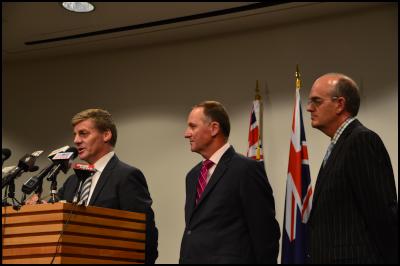
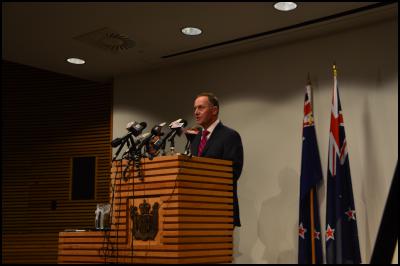
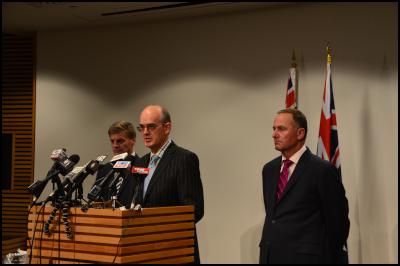
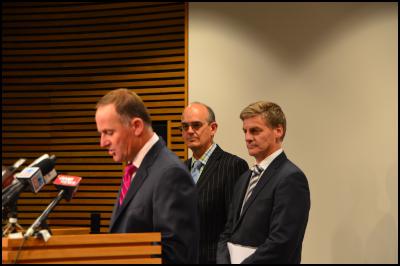
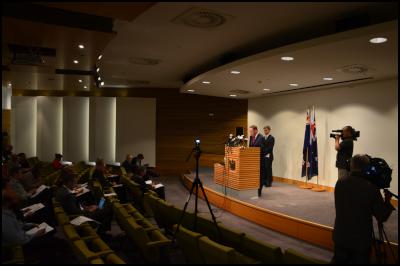



 Ramzy Baroud: Civil War On The Horizon? The Ashkenazi-Sephardic Conflict And Israel’s Future
Ramzy Baroud: Civil War On The Horizon? The Ashkenazi-Sephardic Conflict And Israel’s Future Gordon Campbell: On The Government’s Latest Ferries Scam
Gordon Campbell: On The Government’s Latest Ferries Scam Peter Dunne: Dunne's Weekly - While We're Breaking Up Monoliths, What About MBIE?
Peter Dunne: Dunne's Weekly - While We're Breaking Up Monoliths, What About MBIE? Adrian Maidment: Supermarket Signs
Adrian Maidment: Supermarket Signs Ian Powell: Revisiting Universalism
Ian Powell: Revisiting Universalism Martin LeFevre - Meditations: In A Global Society, There Is No Such Thing As “National Security”
Martin LeFevre - Meditations: In A Global Society, There Is No Such Thing As “National Security”